- Home
- Intermediate Lessons
- たら tara Sentence for Discovery
たら tara Sentence for Discovery -
Intermediate Lessons: 33
You have already learned たら tara sentence in lesson 27 and 28. In those two lessons, with the following sentence pattern...
| Sentence 1 | たら、 | Sentence 2 |
...basically you learned about:
|
1. |
Conditional Sentence 明日雨が降ったら、うちでテレビを見ます。 |
|
2. |
When (where the moment is definitely happening in the future) 二十歳になったら、車の免許を取りたいです。 |
In this lesson, you will be learning yet another function of たら tara sentence - Discovery. The sentence pattern is similar, except that Sentence 2 is always in past tense.
| Sentence 1 | たら、 | Sentence 2 (Past tense) | - Express fact in the past |
The conjugation for Sentence 1 is the same as before, only with the difference that Sentence 2 is in the past tense. You might recall that Sentence 2 is always in present tense in lesson 27 and 28.
This expression indicates that Sentence 2 is realized or noticed when Sentence 1 is realized. Sentence 1 is always an action and Sentence 2 must be a state. Sentence 2 cannot be an action.
Basically you'll use the above sentence pattern in two cases.
First Case to use たら tara Sentence for Discovery
Through the action in Sentence 1, Sentence 2 (what had already occurred or happened) was discovered (surprisingly).
Sentence 2 often ends with "~て-form いた" or "~て-form いました".
Let's look at one example...
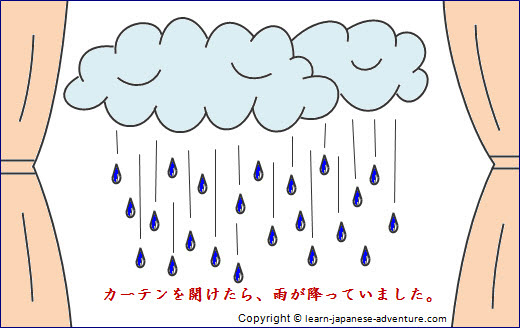
- カーテンを開けたら、雨が降っていました。
ka-ten wo aketara, ame ga futte imashita
Meaning: When I opened the curtain, I discovered that it was raining.
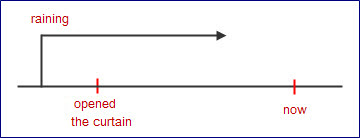
In the above example, both events have already happened.
In the past, I opened the curtain and discovered that it was raining
- ドアを開けたら、大きい犬がいました。
doa wo aketara, ookii inu ga imashita
Meaning: When I opened the door, I discovered that there was a big dog.
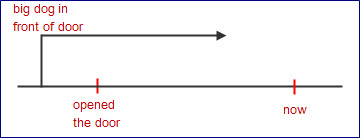
The dog has already been in front of the door before I opened it. But only when I opened the door, then I discovered that the big dog was there.
- デパートへ行ったら、休みでした。
depa-to e ittara, yasumi deshita
Meaning: When I went to the department store, I discovered that it was closed.
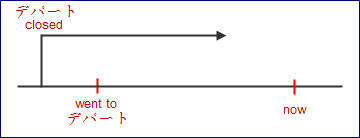
The department store was closed today. But I didn't know about that. Only when I went there, then I found out that it was closed.
- 学校に着いたら、授業が始まっていました。
gakkou ni tsuitara, jugyou ga hajimatte imashita
Meaning: When I arrived at school, lesson had already started.
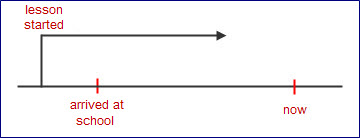
The lesson had started before I arrived at school. I only discovered that when I reached there.
- 郵便受けを開けたら、友達からの手紙が来ていました。
yuubinuke wo aketara, tomodachi kara no tegami ga kite imashiata
Meaning: When I opened my letter box, I discovered that the letter from my friend had already arrived.
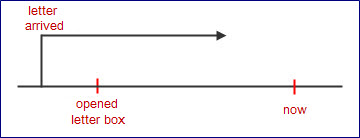
The letter from my friend arrived before I opened the letter box.
Second Case to use たら tara Sentence for Discovery
Sentence 2 occurred as a result of some action in Sentence 1 (unexpectedly).
- アイスクリームを食べたら、お腹が痛くなりました。
aisukuri-mu wo tabetara, onaka ga itakunarimashita
Meaning: I ate ice-cream, then I had a stomach-ache. (As a result of eating ice-cream, I had a stomach-ache)
Both events had already happened in the past. That means, in the past, I ate ice-cream, then I had a stomach-ache. If I didn't eat ice-cream, I wouldn't have a stomach-ache.
Similarly, for the rest of examples, something happened unexpectedly as a result of the actions in Sentence 1.
- コーヒーを飲んだら、寝られませんでした。
ko-hi- wo nondara, neraremasendeshita
Meaning: I drank coffee, and I couldn't sleep. (As a result of drinking coffee, I couldn't sleep)
- 宝くじを買ったら、800ドル当たりました。
takarakuji wo kattara, happyaku doru atarimashita
Meaning: I bought lottery, and I won $800. (As a result of buying lottery, I won $800)
- ジムに行ったら、田中さんに会いました。
jimu ni ittara, tanaka san ni aimashita
Meaning: I went to the Gym, and I met Ms Tanaka there. (As a result of going to the Gym, I met Ms Tanaka)
Summary
In the first case of たら tara Sentence for Discovery, it normally delivers a surprise feeling. You discovered something and become surprised.
In the second case, what happened next (as a result of the first action) was unexpected.
In either case, the most difficult part is the regulation you need to take note of when using this sentence pattern.
Regulation - when using たら tara Sentence for Discovery
Intentional acts by the speaker cannot be used in Sentence 2
This regulation is quite self-explanatory because if you have speaker's intentional action in Sentence 2, it's no longer a discovery, nor it's a surprised or unexpected event.
Let's see an example...
- 去年日本へ行きました。ホテルに泊まりました。
kyonen nihon e ikimashita. hoteru ni tomarimashita
Meaning: I went to Japan last year. I stayed in a hotel.
Both events in the above example are facts in the past. I went to Japan last year and I stayed in a hotel.
However, you cannot connect the two sentences with たら tara sentence.
Because the action of staying in hotel was an intentional act decided by you. You chose to stay in a hotel. This is not a surprised or unexpected event.
You cannot say...
- 去年日本へ行ったら、ホテルに泊まりました。 X
kyonen nihon e ittara, hoteru ni tomarimashita X
But you can say...
- 去年日本へ行って、ホテルに泊まりました。
kyonen nihon e itte, hoteru ni tomarimashita
Meaning: I went to Japan last year and stayed in a hotel.
The above example was just two actions in order of occurrence using て-form. First I went to Japan, then I stayed in a hotel.
Therefore, for たら tara Sentence for Discovery, no intentional acts by the speaker in Sentence 2.
Related Pages
Lesson 27: たら (tara) Sentence.
Lesson 28: たら (tara) Sentence Special Case.
Ready Set Speak Sale! Get 40% OFF Forever on Premium & Premium PLUS plans! Ends on 18 Apr 2025
The link above is an affiliate link, which means that I would earn a commission (at no extra cost to you) if you do end up purchasing the related learning course.
Previous - Lesson 32: Japanese Demonstrative Expression
Buy me a coffee








Facebook Comments
Don’t see the comments box? Log in to your Facebook account, give Facebook consent, then return to this page and refresh it.